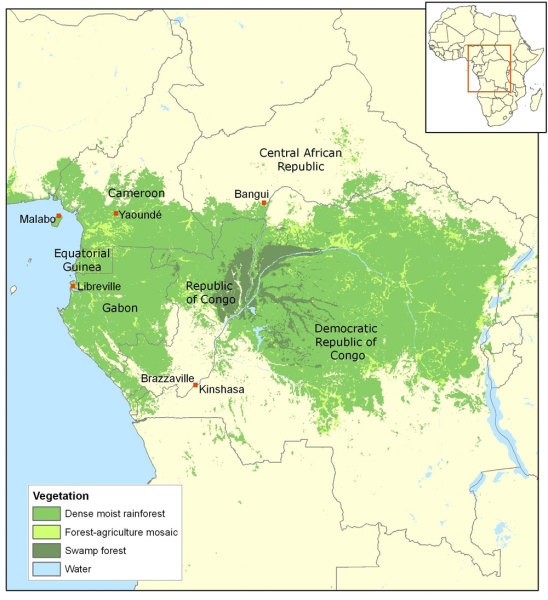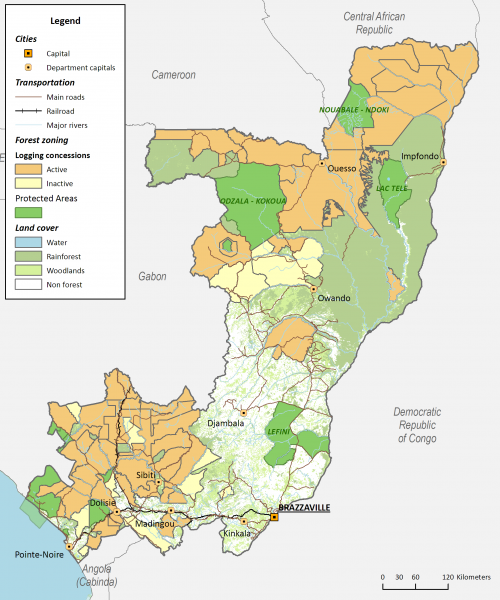Preparing for REDD in the Republic of Congo
-----------------
A new WRI project will quantify forest degradation and associated greenhouse gas emissions in the forests of the Republic of Congo.
The Republic of Congo is part of the larger Congo Basin region, which contains one quarter of the world’s tropical forests. Protecting the region’s forests has become a crucial part of the international effort to combat global warming. Yet the Republic of Congo, like other countries in the Congo Basin, is still putting the systems in place to implement an effective strategy to reduce emissions from deforestation and forest degradation (known as REDD) and to participate in future programs that incentivize reduction in emissions from these sources.
To support this effort, WRI is spearheading an innovative new project entitled Quantifying Forest Degradation and Associated Greenhouse Gas Emissions in the Forests of the Republic of Congo. Planned project activities will:
- Quantify greenhouse gas emissions from the country’s forests,
- Develop new methods to measure and monitor forest degradation,
- Build in-country forest monitoring capacity, and
- Ensure that spatial data sets are transparent and publically available.
WRI will coordinate these project activities with stakeholders from the Ministry of Sustainable Development, Forest Economy and Environment (MDDEFE) in the Republic of Congo, in a process facilitated by the country’s National REDD Coordination Committee (CN-REDD). The CN-REDD will ensure that the project is fully coordinated with the Republic of Congo’s climate change preparedness strategy.
The Forests of the Republic of Congo
Spanning 22.5 million hectares (ha), the forests of Republic of Congo cover two-thirds of the country. They provide significant ecosystem services to local communities such as fuel wood, timber, non-timber forest products, water purification, and cultural and religious values. In addition, these forests help regulate the climate by sequestering significant quantities of carbon, thereby supporting efforts to mitigate global climate change.

Historically deforestation rates in the Republic of Congo have been very low. The 2008 State of the Forests report for Central Africa estimates the annual net deforestation rate in Republic of Congo at 0.03%, driven primarily by small-holder agriculture and urban settlement. Forest degradation, though harder to quantify, is estimated to be a more significant driver of forest change in the country, and the Congo Basin in general. Degradation, while yet to be defined by the United Nations Framework Convention on Climate Change (UNFCCC), occurs as a result of activities such as shifting cultivation, fuel wood collection, selective logging, and the construction of roads for commercial logging or mining activities. A recent study estimates carbon emissions from degradation may be three times greater than those from deforestation in sub-Saharan Africa.
Although historical rates of deforestation and degradation have been relatively low, underlying factors such as population growth, poor rural populations, and lack of alternative sources of energy for low income people are expected to exacerbate forest cover loss in the future. Furthermore, lessons from Latin American and Southeast Asia suggest that commercial farming may gradually replace subsistence agriculture as an important agent of forest cover loss in the Congo basin. The map below illustrates the land cover and status of logging concessions in the Republic of Congo.

REDD: An Opportunity for Forest Conservation
REDD - or reduced emissions from deforestation and forest degradation – is a proposed framework to incentivize reductions in greenhouse gas emissions from deforestation and forest degradation. The range of possible activities that will fall under the framework is still under discussion, and a REDD+ framework is proposed which includes a wider range of forest activities such as enhancing carbon stocks in forests and sustainable forest management.
Whether designed as REDD or REDD+, the framework could provide compensation to governments, communities, companies or individuals who have taken actions to reduce emissions from forest loss below an established reference level. The effective implementation of a REDD strategy in the Republic of Congo can help protect carbon- and biodiversity-rich tropical rainforests while promoting local prosperity. However, countries in the Congo Basin region are currently not well-poised to employ these mechanisms and benefit from these emerging opportunities for several reasons, which the project will address:
-
Countrywide data on forest cover change is not gathered in a systematic fashion, and methods and systems for detecting forest degradation (the dominant form of land use change in the region) are absent. As a result, there is no country-specific information on forest carbon stocks and flows.
-
There is a lack of technical capacity to gather and utilize information on forest carbon. The government of Republic of Congo has not incorporated forest carbon data in their land-use policy decisions.
-
The nation has not yet developed systems to transparently share data on forests and forest carbon or mechanisms to facilitate broad-based civil society participation in REDD decision-making.
Developing Capacity in the Republic of Congo
WRI’s new project will address these challenges by providing data, methods and assistance in developing national forest carbon accounting strategies and reference forest carbon emission levels. The initiative aims to develop Republic of Congo’s capacity to meet future UNFCCC technical requirements for measuring, reporting and verifying information on forest change and associated GHG emissions.
Main project activities include:
-
Quantifying forest carbon emissions from land use change, including tree cover change and forest degradation, using the most up-to-date methodologies and following IPCC Good Practice Guidance. These analyses will include an update of forest cover change from 2005-2010 and add missing years going back to the 1990s.
-
Testing a variety of novel methods for measuring and monitoring fine-scale degradation – e.g. from selective logging - and calculate associated GHG emissions through field work. Additionally, the project will evaluate these pilot technologies to determine the most appropriate options balancing accuracy, cost and ease-of-use.
-
Developing the capacity of the Observatoire Satellital des Forêts d’Afrique Centrale (OSFAC) as a regional center of excellence in forest monitoring and carbon accounting. OSFAC will be trained by WRI and partners on remote sensing and the carbon accounting methodologies for monitoring changes in forest extent, quality, and carbon emissions.
-
Working closely with the government’s National REDD coordination committee to ensure integration with policy and coordination with other REDD initiatives in the country. This engagement includes a series of policy workshops with decision-makers in government ministries on how methods for monitoring and measuring forest loss/degradation and associated GHG emissions underpin REDD+ policies.
-
Ensuring that the information, spatial datasets, and maps developed through this project will be transparently produced and publically available. Additionally, the project will encourage participation of civil society, academic institutions, and local communities through a series of training events on the drivers of deforestation and degradation, costs and benefits of alternative policies, and lessons learned from other countries.
Project Partners and Collaborators
WRI will collaborate with the following project partners:
- A research group from the Geographic Information Science Center of Excellence at South Dakota State University, led by Dr. Matthew Hansen, will use satellite imagery to provide annual estimates of deforestation from 2000 to 2010. Additionally, the team will test new methods to measure forest degradation.
- Dr. Sandra Brown and a team from the Ecosystem Services Unit of Winrock International will lead the assessment of carbon stocks and flows.
- A team from the Instituto do Homem e Meio Ambiente da Amazônia, led by Dr. Carlos Souza, will apply low-cost semi-automated methods of measuring forest degradation developed in Brazil to the forests of the Republic of Congo.
- The Observatoire Satellital des Forêts d’Afrique Centrale (OSFAC) will participate in all project activities and staff will be trained by WRI and partners on remote sensing and the carbon accounting methodologies for monitoring changes in forest extent, quality, and carbon emissions. OSFAC will go on to become a regional training center for government and civil society stakeholders.
- WRI will collaborate with stakeholders from the Ministry of Sustainable Development, Forest Economy and Environment (MDDEFE) on REDD preparedness activities.
- The Republic of Congo’s National REDD Coordination Committee will work closely with WRI and partners to ensure that the project activities are coordinated with the country’s climate change preparedness strategy.
For more information on this project, please contact: Peter Mbile, Project Manager
---------------

